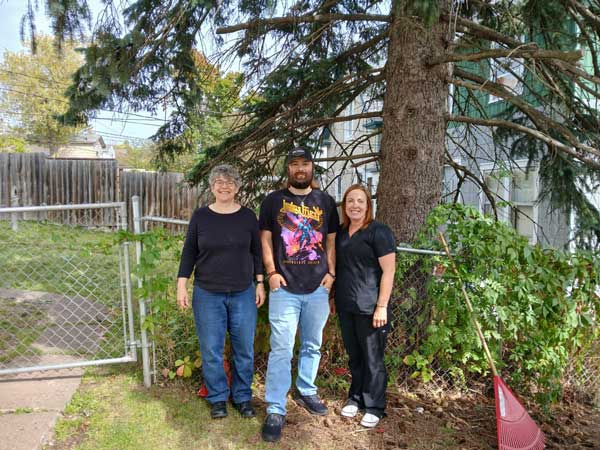Residential pharmacists provide medication optimization in Duluth’s Center for Alcohol & Drug Treatment
October 9, 2024

Dr. Lucas Kosobuski, adjunct assistant professor and Dr. Keri Hager, professor and associate dean for clinical affairs at the College of Pharmacy are implementing a medication support team at the Center for Alcohol & Drug Treatment (CADT) thanks to a two-year grant from the Victory Fund. The interprofessional, residential treatment team will provide individualized care to support clients during their recovery journey.
“We wanted to have a pharmacist meet with every client as they came in to really help them get their medications organized, connect to primary care and psychiatry, work with the nursing team and clinical staff to help them get their medications optimized, and hopefully bolster their ability to stay in recovery once they depart the program,” Hager said.
The center, located in Duluth, provides a wide array of substance use recovery and mental health care, supporting clients through treatment and harm reduction strategies. The college’s partnership with CADT has led to expanded pharmacy services, medication education for patients, development of a comprehensive medication management (CMM) practice, and an overall increase in medical support and consultation.
When Hager joined the CADT team in 2019, she helped accelerate CADT’s progress by building bridges between local health care and substance use organizations, improving their access to electronic health records, and securing a grant to fund a medication support team, which includes Kosobuski’s position as a residential pharmacist and the hiring of a medication navigator, Lindsay Kaufmann. The medication support team will provide one-to-one CMM for clients. Kosobuski, who is a PharmD graduate from the college’s Duluth campus, PGY1 Residency Program graduate via Welia Health, and a Clinical and Translational Science Institute scholar, developed a 12-week curriculum for the team, which has been well received by both clients and staff. Graduating with the mental health emphasis area equips him to train staff similarly while also collaborating with Tribal communities, local and regional health systems, and harm reduction organizations. Now that CADT has hired him as a residential pharmacist, he has the opportunity to get to know the clients individually as people, build an infrastructure for the workflow, referrals, and documentation for the services being offered, and have a consistent presence with clients.
“I think a lot of [clients] really appreciate having that medical knowledge given to them, though a lot of them already have some degree of knowledge,” Kosobuski said. “Having the whole wraparound experience and teaching, a lot of them have embraced that and I try not to shove things on them as well, I’m meeting them where they're at.”
Hager says patients at CADT have embraced Kosobuski, whether that’s because of his “calm, stable, unflappable demeanor,” his non-judgmental approach, his sporting of normal, street clothes rather than a white coat, or the fact that he simply sits in a chair next to them to talk rather than a sterile office. Kosobuski’s identity as a descendant of the Zagaakwaandagowininiwag (Bois Forte Band of Chippewa) Tribe may also aid his comforting presence with CADT clients, 30-50% of whom are Indigenous peoples, Hager said.
“He sees the gaps in our health care system and our addiction care system,” Hager said. “And because we're outside of the biomedical system … there’s a lot of inefficiency and still a lot of stigma and discrimination in the health care system.”
Since CADT is a community organization, the team had to log into at least four separate electronic health records to locate a client’s records, which may not even exist within them. They can’t afford expensive access to biomedical libraries or drug databases. But Kosobuski’s recent adjunct faculty appointment will assist them now, offering a much larger pool of medical information resources for his use and providing increased medication support to the CADT team.
Kosobuski envisions a future where CADT can integrate with local health systems and clients can access long-term primary and mental health care. Hager says his impact on CADT is already evident.
“He’s cultivating relationships with our clinical staff, our licensed alcohol and drug counselors, our clinical assistants, our nurse practitioners, and the [clients],” Hager said. “He's only been here since July but he's already done a ton of work to improve our medication use systems while making sure people are getting the right medications at the right time, working with people one-to-one, providing education, focusing on harm reduction, and really meeting people where they are.”